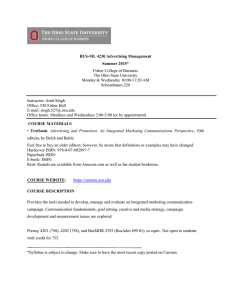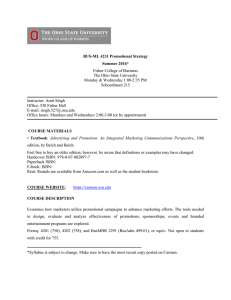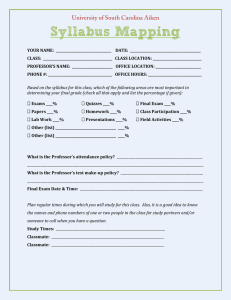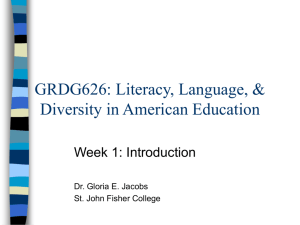Tentative syllabus Fisher College of Business The Ohio State University
advertisement
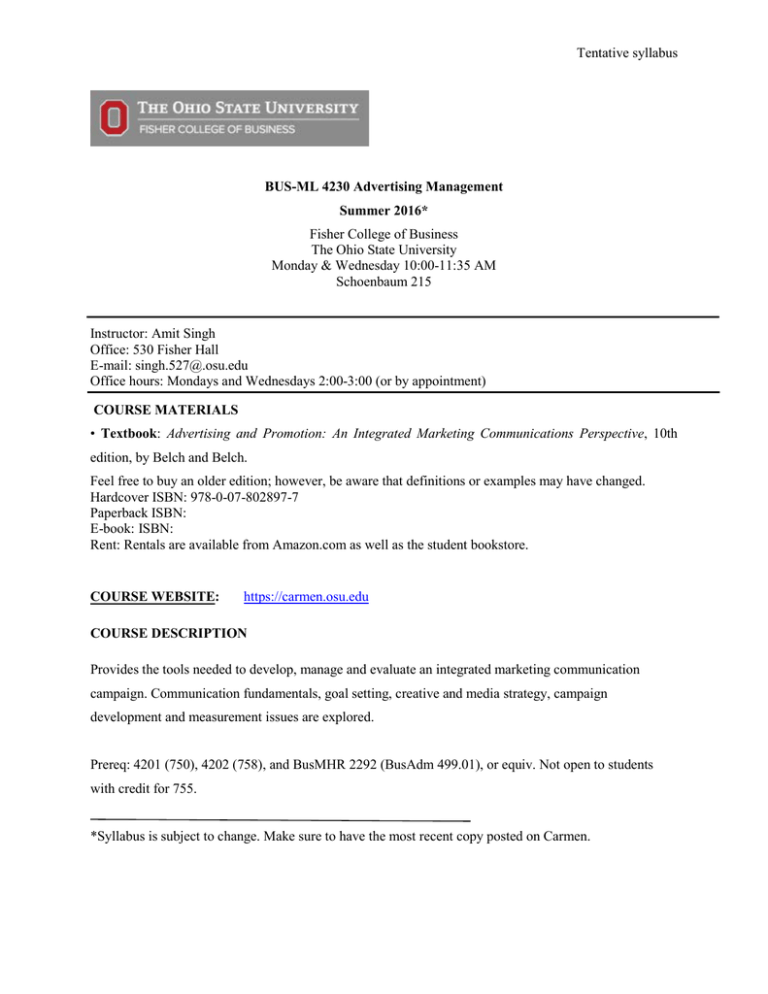
Tentative syllabus BUS-ML 4230 Advertising Management Summer 2016* Fisher College of Business The Ohio State University Monday & Wednesday 10:00-11:35 AM Schoenbaum 215 Instructor: Amit Singh Office: 530 Fisher Hall E-mail: singh.527@.osu.edu Office hours: Mondays and Wednesdays 2:00-3:00 (or by appointment) COURSE MATERIALS • Textbook: Advertising and Promotion: An Integrated Marketing Communications Perspective, 10th edition, by Belch and Belch. Feel free to buy an older edition; however, be aware that definitions or examples may have changed. Hardcover ISBN: 978-0-07-802897-7 Paperback ISBN: E-book: ISBN: Rent: Rentals are available from Amazon.com as well as the student bookstore. COURSE WEBSITE: https://carmen.osu.edu COURSE DESCRIPTION Provides the tools needed to develop, manage and evaluate an integrated marketing communication campaign. Communication fundamentals, goal setting, creative and media strategy, campaign development and measurement issues are explored. Prereq: 4201 (750), 4202 (758), and BusMHR 2292 (BusAdm 499.01), or equiv. Not open to students with credit for 755. *Syllabus is subject to change. Make sure to have the most recent copy posted on Carmen. Tentative syllabus COURSE OBJECTIVES There are two general goals of this course. The first is to introduce you to the field of integrated marketing communications (IMC), with a specific emphasis on the role of advertising elements. We will examine the process by which IMC programs are planned, developed and executed and the factors that influence this process. Consideration will be given to how to assess the effectiveness of IMC tools as well as the overall IMC program. The second goal is to apply the concepts we learn to real world business problems. This means that you will come away from this class knowing how to identify and deliver solutions that are immediately useful to any organization or for starting your own company. In short, this class is all about relevance and the focus will be on how to use learned concepts. CLASSROOM FORMAT Class will be a mixture of lecture, discussion, group work, debate, and case analysis. To be ready to contribute to the class discussion and earn a high participation grade, you must read the material before class. Each session’s assignment will be available in a file in the content area of the Carmen web site. Each file will contain the reading assignment and a set of discussion and sometimes study questions. You should read the assignment sheet both before and after reading the assigned materials. Also, I will be handing out additional material such as problems, notes, topical articles and examples when appropriate. COURSE REQUIREMENTS AND GRADING Standards of Integrity and Conduct: Each student in this course is expected to be familiar with and abide by the principles and standards set forth in The Ohio State University’s code of student conduct and code of academic conduct. You can view these documents or download a pdf version at: http://studentaffairs.osu.edu/csc/ It is also expected that each student will behave in a manner that is consistent with the Fisher Honor Statement, which reads as follows: As a member of the Fisher College of Business Community, I am personally committed to the highest standards of behavior. Honesty and integrity are the foundations from which I will measure my actions. I will hold myself accountable to adhere to those standards. As a future leader in the community and business environment, I pledge to live by these principles and celebrate those who share these ideals. Tentative syllabus While most students have high standards and behave honorably, like every academic institution we sometimes encounter cases of academic misconduct. It is the obligation of students and faculty to report suspected cases of academic and student misconduct. Students can report suspected violations of academic integrity or student misconduct to faculty or to a program's leadership. All reported cases of academic misconduct are actively pursued and confidentiality is maintained. Grading Policies and Practices: With the objective of establishing as dynamic and effective of a learning environment as possible, the course requires a commitment on your part not only to attend all classes, but to prepare fully and to participate. We will work together to create an environment in which open, rigorous discourse is the standard. Thus, each of you must be willing not only to share your ideas and analysis with your colleagues, but be open to challenges of those ideas. Note: I do not curve grades in this course*. It is theoretically possible for everyone in the class to get an A (or an E). Your performance depends only on how you do, not on how everyone else in the class does. It is therefore in your best interests to help your classmates, while acting within the bounds of the stated academic integrity policy. Missed tests. If you miss a test without a certified medical excuse or prior instructor approval, you will take a makeup test at a designated time during the last week of the semester. The makeup exam will be fair but comprehensive (covering all the course material) and challenging. Tests missed with certified medical excuses or prior instructor approval will be dealt with individually. Only one missed test can be made up. Note: if you show up to take the test, you must take the grade – you cannot decide mid-way through to walk out and take the makeup exam. There are 1000 possible points to be earned through assignments for this course. Points are allocated as follows: Class Component Points Exam 1 250 Exam 2 250 Individual Project (Assignment) 100 Final Project (Group) 300 Class participation and Attendance 100 Total 1000 Tentative syllabus (1) Exams (250 x 2) There are two exams. Each exam is independent and NOT comprehensive. • Primarily, exams will be based on topics covered in classroom lectures and discussions, including content from videos and case discussions that is conceptual (not factual information from these materials, such as names and dates). • Secondarily, exams will cover assigned readings in the textbook, readings book, and articles. There is much more material in your textbook and related assignments than is possible to cover and develop in detail in class, where we will touch on and further develop only some of the most important issues. Although tests will emphasize topics that are covered in both the readings and class, they will also include the core material and key concepts from your assigned reading and end-of-chapter questions not covered in class. Pay special attention to chapter learning objectives (“Chapter Key Points”), Key Terms (boldfaced and listed at the end of each chapter), and end-of-chapter Review Questions and assigned Discussion Questions for each assigned chapter. You should integrate the lectures, class discussions, and assigned readings to best prepare for exams. Each exam will consist of a format emphasizing application of concepts learned and will include the following types of questions: (1) concepts (definitions/explanations and examples), (2) conceptual/descriptive short answers, and (3) situational applied problem-solving short answers. To give everyone the opportunity to be fully prepared for the test, I have allotted some time before each exam to quickly and thoroughly go over the material and to allow for Q&A. We will, however, cover concepts, theories and chapters that are guaranteed to be on the exam and will only be addressed in class and not posted on Carmen. (2) Individual Project (100) The individual project will consist of identifying an advertisement (current or past) analyzing it and connecting it to the concepts discussed in class and text. The advertisement can be related to any product and can come from any media (print media, videos or audio). Students will have to submit the advertisement (upload on Carmen) and a one page document explaining what concepts were used in designing the ad (discussed in class and text). Further details about the individual project will be discussed in class. Tentative syllabus (3) Final Project (Group) (300) - Advertising Campaign: The Pitch format Assignment: Using the concepts learned, reviewed and discussed both in class and in the text, you (the group) will create a creative brief and provide your evaluation of an advertisement. More specifically, you will select an advertisement (newspaper, radio, magazine, billboard) that you feel “Misses”- you find the ad to be uninteresting/not working, uninspiring, and/or easy to ignore. A copy of the ad will have to be submitted. Print ads can be attached to your document. Advertisements using other forms of media could be on a CD as video/audio file or submitted as a link to a website. You will then create an advertising plan as if your team is handling the client (The Pitch format). The analysis should discuss why the previous ad didn’t work and then your new strategy and new version in whatever format you think works best for communicating the message. More specific details will be given in class. (a) Presentation: The group will present the plan to the class (the ad along with analysis and new strategy). A comprehensive plan is generally 20-25 Power-point slides. Each presentation will be evaluated by other students as well as the instructor. (b) Written portion: Your deliverable will be no more than a five page (single spaced) memo/analysis on 8.5 x 11 paper, with one-inch margins all around in 12 point, Times New Roman font. Questions to help you structure your proposals will be provided, and more details will be discussed in class. This portion of the project will be due in the Carmen Dropbox by Saturday, June 18 at midnight, after which time the Dropbox will close and a zero (0) will be awarded. You are welcome to turn in the assignment on Carmen at any point before this date. (4) Class Contribution and Attendance (100) The course tends to be more applied and so it becomes essential to apply the learned concepts on some problems. We will work on different exercises and try to solve real market problems in class. This makes class attendance essential. In addition, participation is an important part of the learning process and I strongly encourage you to be actively involved. Grade Appeal Policy: I will provide timely feedback and adopt a fair and equitable grading philosophy. Grades on exams and assignments are intended to reflect the overall quality of performance of the student(s). If you think your grade on an exam or assignment does not reflect the quality of your performance, submit a clear written explanation of your reasoning within three days after the return of your assignment or test (given we have only six weeks in total). The written document need not be long, but must clearly identify the problem or issue of concern. Any grade appeals must be conducted in writing via email. I will carefully consider all such appeals. I reserve Tentative syllabus the right to re-grade all portions of an assignment or test. There will be no grading appeals after the oneweek deadline has passed. Students with Disabilities Any student who feels s/he may need an accommodation based on the impact of a disability should contact me privately at the beginning of the semester to discuss your specific needs. In addition, please contact Office of Disability Services at 614-292-3307 (150 Pomerene Hall) to coordinate reasonable accommodations for students with documented disabilities. Class Schedule and Readings (Tentative) Week Date Topic Readings due before class 1 05/11 Course introduction. Ch. 1 05/16 Introduction to Integrated Marketing Communications (IMC) 2 05/18 Targeting and Positioning Ch.2 05/23 Consumer Behavior Ch.4 Organizing for Advertising Ch.3 05/25 Source, Message, and Channel Ch.6 Factors. Exam Review 3 4 5 05/30 Exam I Exam I 06/01 Creative, Strategy: Planning Ch.8 06/06 Creative Strategy: Implementation Ch.9 06/08 Media Planning and International Ch.10 Individual project due by Advertising Midnight (EST) on July Ch. 21 Exam Review 15. 06/13 Exam II Exam II 06/15 Presentations Written Proposal Due by Midnight (EST) on Saturday, June 18.
